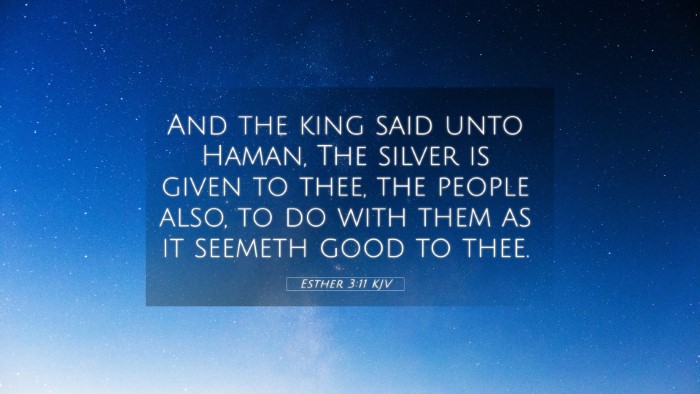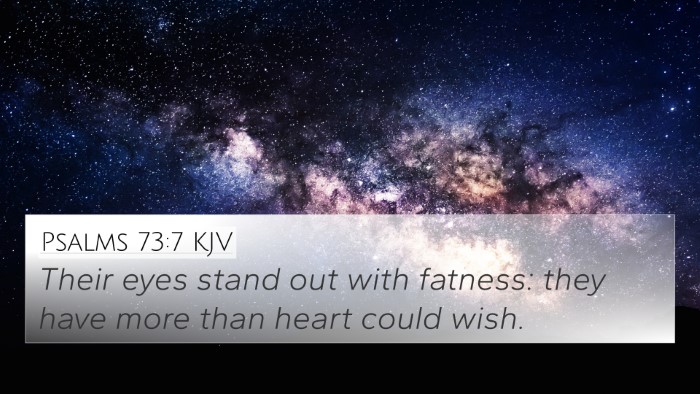Old Testament
Genesis Exodus Leviticus Numbers Deuteronomy Joshua Judges Ruth 1 Samuel 2 Samuel 1 Kings 2 Kings 1 Chronicles 2 Chronicles Ezra Nehemiah Esther Job Psalms Proverbs Ecclesiastes Song of Solomon Isaiah Jeremiah Lamentations Ezekiel Daniel Hosea Joel Amos Obadiah Jonah Micah Nahum Habakkuk Zephaniah Haggai Zechariah MalachiEsther 3:11 Similar Verses
Esther 3:11 Cross References
And the king said unto Haman, The silver is given to thee, the people also, to do with them as it seemeth good to thee.
Uncover the Rich Themes and Topics of This Bible Verse
Listed below are the Bible themes associated with Esther 3:11. We invite you to explore each theme to gain deeper insights into the Scriptures.
Esther 3:11 Cross Reference Verses
This section features a detailed cross-reference designed to enrich your understanding of the Scriptures. Below, you will find carefully selected verses that echo the themes and teachings related to Esther 3:11 KJV. Click on any image to explore detailed analyses of related Bible verses and uncover deeper theological insights.

Jeremiah 40:4 (KJV) »
And now, behold, I loose thee this day from the chains which were upon thine hand. If it seem good unto thee to come with me into Babylon, come; and I will look well unto thee: but if it seem ill unto thee to come with me into Babylon, forbear: behold, all the land is before thee: whither it seemeth good and convenient for thee to go, thither go.

Jeremiah 26:14 (KJV) »
As for me, behold, I am in your hand: do with me as seemeth good and meet unto you.

Luke 23:25 (KJV) »
And he released unto them him that for sedition and murder was cast into prison, whom they had desired; but he delivered Jesus to their will.
Esther 3:11 Verse Analysis and Similar Verses
Understanding Esther 3:11
Esther 3:11 states: "And the king said unto Haman, The money is given to thee, the people also, to do with them as it seemeth good to thee."
Summary of Meaning
This verse captures the moment when King Ahasuerus grants Haman the authority to execute his wicked plan against the Jews. The king's unsuspecting endorsement serves as a pivotal point in the narrative, emphasizing themes of power, manipulation, and the dire consequences of unchecked authority.
Insights from Public Domain Commentaries
-
Matthew Henry:
Henry comments on Ahasuerus's foolishness in placing confidence in Haman, illustrating how leaders can unwittingly empower malevolent individuals. He emphasizes the importance of discernment in leadership and the far-reaching consequences of poor decisions.
-
Albert Barnes:
Barnes focuses on the monetary aspect of this transaction. He points out that Haman's use of wealth to influence the king showcases the corrupting power of money and how it can distort justice and lead to oppression.
-
Adam Clarke:
Clarke elucidates the implications of giving Haman such power. He notes that this act illustrates the volatility of public favor and how swiftly fortunes can change in the realm of politics. Clarke underscores the necessity for wisdom and justice in governance.
Thematic Connections
This verse exemplifies several overarching themes found throughout the Bible, particularly with respect to authority, justice, and communal crises faced by the Jewish people.
Comparative Analysis with Related Bible Verses
- Proverbs 29:2: "When the righteous are in authority, the people rejoice: but when the wicked beareth rule, the people mourn."
- Esther 8:1: "On that day did the king Ahasuerus give the house of Haman the Jew's enemy unto Esther the queen."
- Exodus 23:2: "Thou shalt not follow a multitude to do evil; neither shalt thou speak in a cause to decline after many to wrest judgment."
- Psalm 37:28: "For the Lord loveth judgment, and forsaketh not his saints; they are preserved for ever: but the seed of the wicked shall be cut off."
- Isaiah 5:20: "Woe unto them that call evil good, and good evil; that put darkness for light, and light for darkness."
- James 4:3: "Ye ask, and receive not, because ye ask amiss, that ye may consume it upon your lusts."
- Galatians 6:7: "Be not deceived; God is not mocked: for whatsoever a man soweth, that shall he also reap."
Inter-Biblical Dialogue
The events surrounding Esther 3:11 invite deeper theological reflection on the nature of human authority and its alignment (or misalignment) with divine justice. The following themes can be explored:
- God's Sovereignty: Despite Haman's apparent success, God's hand is actively at work behind the scenes, ultimately leading to Haman's downfall.
- Justice and Retribution: The narrative showcases that actions aligned with evil motives lead to inevitable consequences, resonating with the moral order established by God.
- Leadership and Accountability: This verse serves as a warning about the responsibilities of leaders to safeguard their people from harm, reinforcing the biblical principle that authority comes with great accountability.
Conclusion
Esther 3:11 is more than just a historical account; it offers rich insights into human nature, the dynamics of power, and the importance of righteous leadership. By cross-referencing this verse with others, we can draw meaningful connections that enhance our understanding of Scripture and its application to our lives today.



